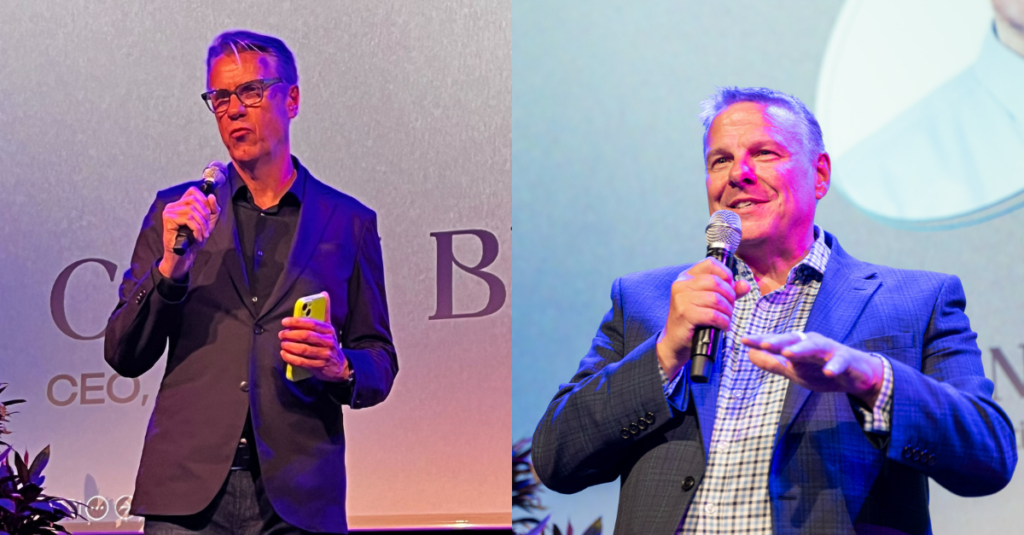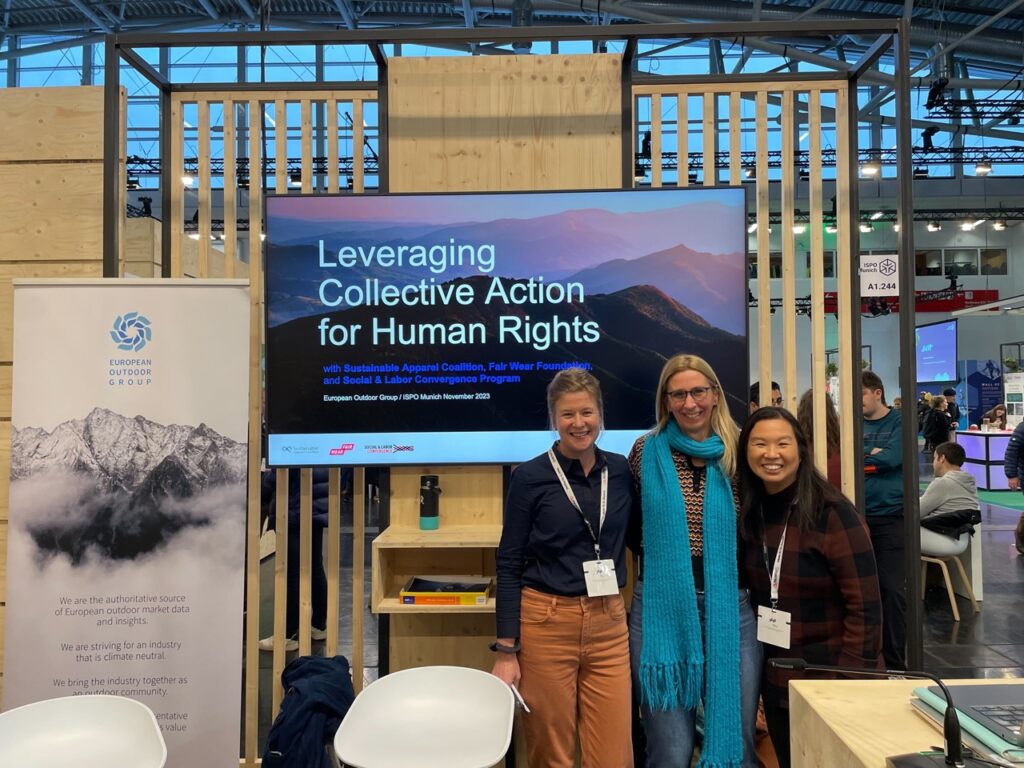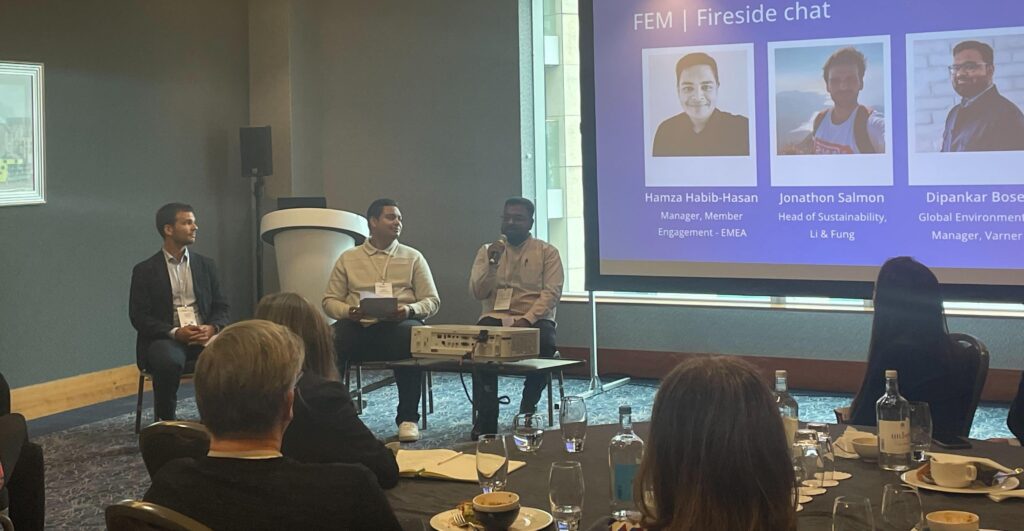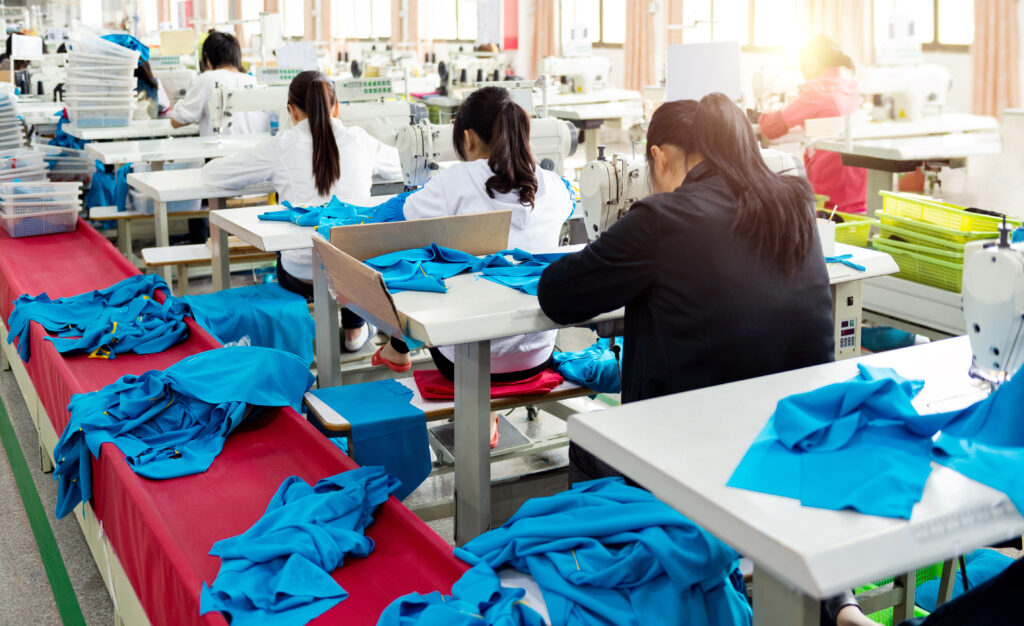
Cascale, Worldly Host Climate Event, Mark Decarbonization Steps
The organizations co-hosted a New York Climate Week Event with many fantastic speakers and insights. Read more here!
Cascale and Open Supply Hub (OS Hub), a nonprofit leader in supply chain transparency, announce a strategic collaboration aimed at accelerating transparency and sustainability across global supply chains.

Cascale and Open Supply Hub announce a strategic collaboration aimed at accelerating transparency and sustainability across global supply chains.
Amsterdam, Hong Kong, Oakland (CA) – October 23, 2024: Cascale (formerly the Sustainable Apparel Coalition), the global nonprofit alliance dedicated to driving equitable and restorative business practices in the consumer goods industry, and Open Supply Hub (OS Hub), a nonprofit leader in supply chain transparency, announce a strategic collaboration aimed at accelerating transparency and sustainability across global supply chains. This collaboration will combine Cascale’s industry influence with OS Hub’s transparency model to create open, accessible data that empowers businesses to make responsible, impactful decisions. Together, the two organizations will work to foster a more transparent, accountable, and sustainable supply chain in the consumer goods industry.
This collaboration matters deeply to Cascale’s members and the broader industry as it addresses pressing challenges such as supply chain transparency, decarbonization, and human rights due diligence. By integrating Cascale’s extensive community of manufacturers, brands, retailers, and more with OS Hub’s data infrastructure, members can supplement the insights gathered through Cascale’s Higg Index tools, exclusively available on Worldly, with even more reliable, actionable data that can be used to strengthen collaborative sustainability efforts. This collaboration is not only an opportunity for increased accountability but also a driver for innovation and industry-wide action.
“Cascale is excited to work closely with Open Supply Hub to deliver meaningful progress towards a more transparent and sustainable supply chain,” said Colin Browne, CEO, Cascale. “Our members are hungry for change, and this comes with amplifying the existing tools, best practices, and resources that allow them to collaborate effectively and, ultimately, lead to greater improvements for the industry. We applaud the work Open Supply Hub has done thus far, and we are committed to working together to advance the disclosure of Tier 1 suppliers on Open Supply Hub. This data-driven initiative is a significant step forward in meeting the growing expectations for transparency and responsible business practices.”
“Building supply chain transparency programs individually isn’t enough. Unless we ensure that supply chain data is harmonized, interoperable, and poised for action, it’s incredibly difficult to realize the benefits of true transparency, and capitalize on collective opportunities,” said Natalie Grillion, CEO and Executive Director at Open Supply Hub. “We see this collaboration with Cascale as a critical stepping stone toward building safe and sustainable supply chains together. By combining Cascale’s extensive community and our model for making their data easy to share and work with, we can drive meaningful change faster than ever. This joint effort enables Cascale members to move beyond compliance and tick box exercises to decisive action on transparency, sustainability, and responsible sourcing, where reliable data leads to real-world impact across supply chains.”
To learn more about OS Hub, Cascale members and interested parties are invited to join the upcoming OS Hub webinar, Open Data Open Doors on November 21. During this live webinar, OS Hub will highlight how their uniquely built open database of over half a million production locations can be leveraged to advance supply chain transparency and sustainability goals. Attendees will also gain insights into the platform’s latest technical updates and an exclusive preview of upcoming developments planned for 2025. Early next year, Cascale members can expect further updates on joint initiatives and opportunities to get involved.
Cascale is the global nonprofit alliance empowering collaboration to drive equitable and restorative business practices in the consumer goods industry. Formerly known as the Sustainable Apparel Coalition, Cascale owns and develops the Higg Index, which is exclusively available on Worldly, the most comprehensive sustainability data and insights platform. Cascale unites over 300 retailers, brands, manufacturers, governments, academics, and NGO/nonprofit affiliates around the globe through one singular vision: To catalyze impact at scale and give back more than we take to the planet and its people. LinkedIn | X | Instagram | Facebook | YouTube
Open Supply Hub is a non-profit platform powering the transition to safe and sustainable production, with the world’s most complete, open and accessible global supply chain map. With their users, they have mapped over half a million production locations around the world, showing where global production is happening and who is connected to each location. Open Supply Hub is used by some of the world’s best known brands, as well as human rights, labor and environmental groups. Individually or together, those organizations can contribute, download, and search the data to spot opportunities, build partnerships, and drive investment and impact. By making collectively built supply chain data easy for anyone to work with, Open Supply Hub’s model is opening doors to new solutions, targeted investment, and more effective collaborations. Explore | LinkedIn | YouTube | Subscribe

Amsterdam, Hong Kong, Oakland (CA) – August 06, 2024: Cascale, a global nonprofit alliance empowering collaboration to drive equitable and restorative business practices in the consumer goods industry formerly known as the Sustainable Apparel Coalition, and the ZDHC Foundation, an organization leading global value chains to achieve the highest standards for sustainable chemical management, are pleased to announce the signing of a new strategic collaboration. This collaboration underscores a shared commitment to align and advance environmental sustainability in the consumer goods industry.
The two organizations have closely collaborated in the past years, aligning the Higg Brand and Retail Module (BRM) with ZDHC’s Brands to Zero reporting and, as of November 2023, ZDHC’s Supplier to Zero Programme aligns with Cascale’s Higg Facility Environmental Module (FEM) 4.0. This next collaboration stage aims to elevate the integration of processes, focusing on the organizations’ core competencies and establishing joint efforts to deliver a harmonized approach to facility-level environmental sustainability performance.
By integrating efforts, Cascale and ZDHC will continue to drive collective action, ensuring consistent improvements across multiple environmental impact areas such as (waste)water, sustainable chemical management and air.
Key focus areas, including the high-level goals, of the collaboration include:
These initiatives streamline processes, reduce redundancies, enhance data quality, and promote unified industry-wide education on sustainable chemical management.
“We are thrilled to join forces with ZDHC to drive forward our shared vision of environmental sustainability,” said Colin Browne, chief executive officer of Cascale. “This collaboration represents a significant step towards aligning industry practices and achieving measurable impact at scale.”
“The partnership with Cascale is a pivotal moment in our mission to advance our environmental sustainability efforts. At ZDHC, we believe systemic change is not about marketing headlines but foundational efforts. It requires a harmonized approach from NGOs, policymakers, and the industry, all working together towards realistic goals,” stated Frank Michel, CEO of the ZDHC Foundation.
Cascale Press Contact
Bobbie Semple, Account Supervisor, Small Girls PR
Email: cascale@smallgirlspr.com
About Cascale
Cascale is the global nonprofit alliance empowering collaboration to drive equitable and restorative business practices in the consumer goods industry. Formerly known as the Sustainable Apparel Coalition, Cascale owns and develops the Higg Index, which is exclusively available on Worldly, the most comprehensive sustainability data and insights platform. Cascale unites over 300 retailers, brands, manufacturers, governments, academics, and NGO/nonprofit affiliates around the globe through one singular vision: To catalyze impact at scale and give back more than we take to the planet and its people.
LinkedIn | X | Instagram | Facebook | YouTube
About ZDHC
The ZDHC Foundation leads the fashion industry in preventing harmful substances from being used in fashion production. It unites over 300 Signatories and develops guidelines, platforms and solutions that empower brands, suppliers, and chemical formulators to achieve the highest standards in safety and sustainability of their chemical management, driving resource efficiency and circularity.
This enables large-scale change towards zero hazardous chemical discharge across complex global supply chains. By creating the collaborative Roadmap to Zero Programme and equipping the fashion ecosystem with solutions, ZDHC plays an instrumental role in advancing the industry towards responsible chemical use that protects people and the planet.
For more information, go to roadmaptozero.com.

Colin Browne, chief executive officer of Cascale, and Andrew Martin, executive vice president, joined industry leaders and sustainability experts at ZDHC Impact Day in Amsterdam.
The Zero Discharge of Hazardous Chemicals (ZDHC) Foundation hosted the event. The NGO aims to lead the fashion industry in preventing hazardous chemicals from being used in fashion production. Building on its theme, “Chemistry in Fashion: Transforming Business,” the event focused on driving positive change in the fashion industry.
Frank Michel, CEO of ZDHC, began the day with a welcome that stressed the importance of emerging legislation. “We need to address policymakers [to] create meaningful regulation,” he said. “NGOs [should develop] mindful campaigns that allow for real systemic change.” Michel then invited Francesco Pianca, board chair at ZDHC, to share opening remarks. Pianca stressed the importance of regulation to move the industry forward. ”There is a waterfall of acronyms that relate to regulation,” he said. “Whether it is ESPR, EPR, CS3D, CSRD, all these regulations have a common denominator, which is chemicals. So we play a huge role in delivering those regulations and especially accelerating our work for a better world.” Michel highlighted the growth of the ZDHC community, which is committed to creating impact, but also noted that conflicting interests can challenge the creation of systemic change.
In his first industry event since joining Cascale as CEO, Colin Browne stressed the importance of collaboration to address industry challenges. “We’re not moving quick enough, we’re not doing enough,” he said. “We are too fractured. There are way too many different initiatives.” Browne called upon attendees to align their efforts and commit to making a lasting impact together.
Later, Cascale’s Andrew Martin joined a session focused on Brands to Zero, an initiative that helps brands and retailers implement sustainable chemical management practices throughout their supply chains. Martin shared how Cascale’s work is aligned: From the beginning, the organization focused on harmonization to reduce duplicating efforts. Like Browne, Martin highlighted the importance of partnerships and collaboration to drive systemic change.
Both Cascale and ZDHC recently published their impact reports showcasing their aligned work. Reflecting on Cascale’s collaborative work with ZDHC, Martin shared the example of how the Higg Facility Environmental Module aligned with the ZDHC Roadmap to Zero on wastewater, chemicals, and air. He also cited ongoing collaborative work on the chemical section of Cascale’s Higg Brand & Retail Module (BRM), which is now 73 percent aligned. Finally, while Martin bluntly challenged attendees on their role in perpetuating industry fragmentation with proprietary approaches, he also asked them to hold industry associations like Cascale and ZDHC to account to further drive alignment around impact areas that limit duplication. “True collaboration takes courage,” he said.
Joyce Tsoi, senior director of the Decarbonization Program at Cascale, joined a panel on “Sustainability and Finance in the World of Textiles” at the ITMAconnect Innovator Xchange Virtual Edition last month.

Joyce Tsoi, senior director of the Decarbonization Program at Cascale, joined a panel on “Sustainability and Finance in the World of Textiles” at the ITMAconnect Innovator Xchange Virtual Edition last month.
Moderated by Jeroen Vits, managing director of ITMA Services, Brussels, the panel also included Ryan Gaines, chief financial officer of Apparel Impact Institute, a Cascale partner, and Michael Rattinger, senior climate change specialist at Asian Development Bank.
Designed to offer perspective and insights on the intersection between sustainability and finance in the global textile supply chain, the panelists discussed sustainability requirements set by global brands and retailers and their impact on the global textile supply chain. Participants also shed light on financial instruments for the textile industry to realize its sustainable transformation demanded by many stakeholders.
Tsoi shared that ITMA is well positioned to weigh in on the transformations in the supply chain, a subject on which Cascale and collaborators are increasingly focused. She detailed how Aii and Cascale formed a strategic partnership in 2023 in order to expand impact and scale the collective knowledge base. Then stakeholders can align on funding, decision-making, and ultimately, accelerate action. For Aii, this chiefly involves Fashion Climate Fund and Climate Solutions Portfolio, which is meant to accelerate action and drive emissions reduction. Cascale’s focus is the Decarbonization Program and corresponding science-aligned targets (SATs) adoption, part of Cascale’s growing program base that is guided by the organization’s “Evolution for Impact” strategy.
With more than 300 members worldwide – including brands and retailers, manufacturers, and affiliate members – Tsoi shared that Cascale effectively represents half of the apparel, textiles, and footwear industry, in terms of revenue. She recommended brands and retailers utilize the Higg Index suite of tools and nominate their suppliers to participate in programs to improve energy efficiency and/or adopt solar rooftops at the facility level. Tsoi advised that brands communicate their climate goals and targets clearly with their suppliers and build deeper engagement on decarbonization intervention projects. These included coal phase out, optimizing energy efficiencies in production, and transitioning to low-carbon or renewable energy fuels or technologies. Overall, she said, the sector needs to realize significant decarbonization efforts in order to keep the global temperature rise within the 1.5-degree Celsius limit by 2030.
Finally, Tsoi shared a promising outlook for textile recycling, which can help to conserve resources in textile production and improve efficiencies. She called for the continued investment in developing these advanced technologies and infrastructure to boost the collection, sorting, and processing of textile waste, as well as research and development of using innovative materials.

Jeremy Lardeau, senior vice president of Higg Index at Cascale, moderated a sustainability stakeholder dialogue at PUMA HQ in Herzogenaurach, Germany, part of a two-day event in which stakeholders converged to discuss the Sustainability Vision 2030 platform for PUMA, which has been a highly committed Cascale member since 2012.
At a panel that included Mike Burgass, co-founder and director at Biodiversity, Jeremy He, sustainability development director at Shenzhou International Group, Lindita Xhaveri-Salihu, business engagement lead at UN Climate Change, and Aishwarya Sharma, representative voice of a RE:GENERATION, Lardeau steered a discussion of critical goals for climate and biodiversity.
The panel discussed PUMA’s 2030 goals, which cover a wide range of sustainability targets including human rights, climate, and circularity, aligned with the United Nations Sustainable Development Goals (SDGs).
Lardeau drew parallels between Cascale’s mission and vision and PUMA’s ambitious 10FOR25 targets. He also pointed out shared values of collaboration and collective action across the consumer goods industry, with notable alignment between PUMA and the ZDHC Foundation.
New collaboration to catalyze the industry towards impactful due diligence

Amsterdam, Hong Kong, Oakland (CA) – March 28, 2024: Cascale, the global nonprofit alliance formerly known as the Sustainable Apparel Coalition, and Fair Wear, an independent nonprofit multi-stakeholder initiative that works to improve conditions for workers in garment factories, have announced a strategic collaboration. The core purpose of the collaboration is to promote human and labor rights.
“Power imbalances in the consumer goods industry can often result in both human rights and environmental risks and violations in supply chains,” said Andrew Martin, executive vice president at Cascale. “More equitable partnerships are not only desirable but are a necessary driving force for continuous improvement in responsible business conduct, and effective due diligence has a pivotal role to play in delivering this. With our membership, representing over 300 organizations in the consumer goods industry, and Fair Wear’s expertise, we work collaboratively to expand and scale the systemic change needed to address the human rights challenges we face.”
“With 25 years of experience in what is now known as human rights due diligence, Fair Wear knows that industry alignment is a condition for real impact on workers,” said Alexander Kohnstamm, executive director at Fair Wear. “Now that legislation is a fact, we are ready to provide Cascale members with Fair Wear’s knowledge and solutions to facilitate impactful due diligence. This collaboration is a great step in raising the bar for human rights in global garment supply chains.”
The industry’s fragmented nature undermines efforts to ensure unified due diligence implementation. Cascale and Fair Wear agree that meaningful change requires collaboration. Therefore, they will work with Worldly, the leader in environmental and social impact data for the apparel and footwear industry, to jointly provide their members with high-quality, reliable resources and guidance. These resources will help navigate the complexities of human rights due diligence effectively, leveraging tools such as Cascale’s Higg Index.
Fair Wear and Cascale have been working to drive sustainability in the apparel and textile industry for decades, collaborating and aligning on several initiatives related to responsible business practices. Both organizations have jointly emphasized and advocated for the critical importance of mandatory due diligence legislation as a catalyst for industry-wide impact. Furthermore, the organizations have actively supported the European Commission’s Corporate Sustainability Due Diligence Directive (CS3D), a recently approved Directive in European Union law that requires due diligence for companies to prevent adverse social and environmental impacts across their value chains. Cascale and Fair Wear welcome the recent approval of CS3D by the Council, as well as the recent approval vote in the European Parliament’s Committee on Legal Affairs (JURI). Together, they eagerly await the European Parliament’s plenary vote to adopt the Directive, expected in April 2024. This vote is expected to contribute to the establishment of a comprehensive framework for sustainable practices in the industry.
Moreover, both organizations understand the urgent need for aligning due diligence efforts with international standards, such as the United Nations Guiding Principles on Business and Human Rights (UNGPs) and the OECD Due Diligence Guidance for Responsible Supply Chains in the Garment & Footwear Sector (OECD Guidelines). This is especially important given the developments in Human Rights and Environmental Due Diligence (HREDD) legislation, such as the EU CS3D. Through this collaboration, Fair Wear and Cascale will help brands meet existing and upcoming legislative requirements.
About Cascale
Cascale is the global nonprofit alliance catalyzing collective action toward equitable and restorative business practices in the consumer goods industry. Spanning 300 retailers, brands, manufacturers, governments, academics, industry associations, and nonprofits across 37 countries, we are united by a singular vision to give back more than we take for people and the planet. Cascale’s membership includes apparel, footwear, home furnishings, sporting and outdoor goods, and bags and luggage companies.
Formerly known as the Sustainable Apparel Coalition, Cascale owns and develops the Higg Index. Initially formed to create standardized sustainability metrics, Cascale has sharpened its focus to driving pre-competitive collective action for a unified industry transformation. As an independent entity, Cascale brings together brands, retailers, manufacturers, NGOs, academics, and industry associations to combat climate change, ensure decent work, and contribute to a nature-positive future.
LinkedIn | Twitter | Instagram | Facebook | YouTube
About Fair Wear
Fair Wear’s mission is to achieve a world where workers’ rights are realised through freedom of association and social dialogue. We want to see the global garment supply chain as a source of safe, dignified and decently paid employment. As a multi-stakeholder initiative, we have connected and convened brands, factories, workers, trade unions, NGOs and other industry influencers, and built strong multi-stakeholder networks across the whole value chain for the past 25 years. Utilising each of their unique leverage, we demonstrate how impactful OECD-aligned HRDD implementation can positively change the lives of the people who make our clothes.

The Sustainable Apparel Coalition (SAC) joined forces with Fair Wear Foundation (FW) and the Social and Labour Convergence Program (SLCP) to present on “Leveraging Collective Action for Human Rights” at ISPO Munich, an annual conference for the global sports business community featuring 2,400 exhibitors.
The presentation took place on the program stage for the European Outdoor Group (EOG), a member and partner of all three organizations. The conversation was grounded in the collaborative work that FW, SLCP, and the SAC have pursued in tandem to leverage complementary tools, data, insights, and thought leadership, igniting social and societal change within the apparel and footwear supply chains.
Representatives from the three multi-stakeholder initiatives presented on why leaders must act collaboratively on human rights injustices and shared strategies on how to promote, improve, and scale meaningful impact and engagement for workers.
Speakers included Erlinda Lee, global membership development director at the SAC, who shared information about the organization’s Higg Index suite of tools, used by businesses to measure, evaluate, and improve social and environmental impact; Lee’s presentation centered on the Higg Facility Social & Labor Module (FSLM).
Mariette van Amstel, head of membership at FW, explored the overarching vision that the three organizations share on goals related to worker rights, social, and labor — following the same Human Rights Due Diligence protocol (HRDD). Lottie Watkinson, business development manager at SLCP, shared details of the high-quality comparable data that the organization brings to the collaborative process.
The presenters also acknowledged the challenges — lengthy supply chain processes, power dynamics, and the absence of a common language — faced by many businesses and organizations. They stressed the relevance of this work to the outdoor industry as a whole, emphasizing how the organizations can support companies with tools and solutions at each stage of their journey. Finally, they emphasized that businesses must take action now if they haven’t already, and be prepared for emerging legislation that will mandate compliance.

San Francisco, Amsterdam, Hong Kong – November 20, 2023: The Sustainable Apparel Coalition (SAC) has become a member of the Sustainability and Health Initiative for Net Positive Enterprise (SHINE) established by the Materials Systems Laboratory (MSL) at the Massachusetts Institute of Technology (MIT). The project researches product-based and organizational handprint creation and net positive assessment, enabling organizations to pursue the creation of positive sustainability-related outcomes in concert with ongoing efforts to reduce their footprints.
“Net Positive reflects the Sustainable Apparel Coalition’s strategic goal of transforming the industry into one that gives more than it takes to people and the planet,” said Amina Razvi, chief executive officer at the SAC. “The work of MIT SHINE aligns with the SAC’s strategic focus on three foundational pillars – combating climate change, ensuring decent work for all, and shaping a nature-positive future. We’re thrilled to join this powerful initiative.”
SHINE @ MIT is a research center dedicated to improving the scientific basis by which NetPositive is assessed at all of these levels: products, activities, companies, economic sectors, individuals, and groups of people. Its work includes the quantitative evaluation of footprints through the science, data, and methodologies of life cycle assessment (LCA). LCAs also provide the basis for estimating the positive impact of innovative products, materials, activities and processes that function with greater efficiency, provide increased benefits, and reduce wastes and adverse effects.
“The idea of Net Positive is conceptually simple,” said Gregory Norris, research scientist and MIT SHINE director. “However, using LCAs to evaluate both the potential good and harm done by apparel with rigor, clarity and credibility is a complex challenge, though it’s one we are devoted to alongside the SAC. We look forward to working with the SAC and accessing the deep well of data presented by the Higg Index suite of tools.”
As a global multi-stakeholder nonprofit alliance that represents about 50 percent of the apparel and textile industry in 36 countries, the SAC facilitates a common approach to measuring sustainability that is grounded in the Higg Index, a suite of tools that utilize LCA data to measure social and environmental impact from materials in products, to how those products are made, to brand practices. Through the continuous evolution of the Higg Index tools, the aim is to provide users with access to the most up-to-date, accurate data against relevant industry standards in order to drive sustainable decision-making across the industry.
“We look forward to collaborating with MIT Shine in our ongoing efforts to provide state-of-the-art tools to support our members in their journey of transformation,” said Jeremy Lardeau, vice president Higg Index. “Initiatives like these help bring the latest academic and scientific developments to the industry in innovative and sometimes disruptive ways, and we look forward to the exciting opportunities for our tools and the value chain impacts they can help drive.”
— ENDS —
About the Sustainable Apparel Coalition:
The Sustainable Apparel Coalition (SAC) is a global, non-profit alliance of over 280 organizations in the apparel, footwear, and textile industry. Initially formed to create standardized sustainability metrics, the SAC has sharpened its focus to driving pre-competitive, collective action across three foundational pillars. As an independent entity, the SAC brings together brands, retailers, manufacturers, NGOs, academics, and industry associations to combat climate change, ensure decent work, and contribute to a nature-positive future. Central to the SAC’s mission is the Higg Index, a suite of comprehensive tools that empower members to measure, evaluate, and improve sustainability performance across the supply chain.

The annual Textile Exchange Conference took place in London this year, and a substantial group of SAC team members from our membership engagement, stakeholder engagement and business development teams were in attendance.
Each year, the conference brings together leaders and experts from across the apparel value chain in an effort to explore opportunities to collaborate and align on climate solutions.
A close collaborator with the SAC, Textile Exchange publishes the open-source Preferred Fiber and Materials Matrix to assess the performance of different sustainability standards within material categories. The nonprofit also provides industry benchmarking data around fibers, including a recent report alongside consultancies Boston Consulting Group and Quantis.
At the SAC Lunch and Learn kindly hosted by Textile Exchange as part of the conference programme for approximately 60 registered attendees, Dani Baker, SAC’s senior membership engagement manager, EMEA, delivered a timely and relevant overview of the Higg Product Module. In addition, Hamza Hasan, candidate and membership engagement manager at the SAC, hosted a Fireside Chat to discuss the launch of the Higg FEM 4.0. “[Higg FEM is] the ticket to the game,” said panelist Jonathan Salmon, head of sustainability at Li & Fung Limited. “It’s not perfect, but there is no perfect tool.” Dipankar Bose, global environmental manager at Varner, concluded that “Higg FEM 4.0 is a future-proof masterpiece!” The SAC team also hosted a drinks reception where attendees had the opportunity to participate in an “Ask Me Anything” session with staff from the SAC, Worldly, and the SAC’s Social & Labor Convergence Program (SLCP).
The SAC enjoys a deep and collaborative relationship with Textile Exchange. With Apparel Impact Institute and Zero Discharge of Hazardous Chemicals (ZDHC), we co-founded the apparel alliance to coordinate and align tools, programs and resources that reduce redundancies and drive performance improvements and collective actions to achieve a 45 percent reduction in greenhouse gas emissions. With the Global Fashion Agenda and the Federation of European Sporting Goods (FESI), we co-founded the Policy Hub to collaborate on technical expertise and propose ambitious sustainability policies for the apparel and footwear industry in Europe.
We were thrilled to participate this year and to contribute to the success of the 2023 Textile Exchange Conference!

New collaboration with the IAF to accelerate efforts towards equitable and sustainable global supply chains for the apparel and fashion industry.
San Francisco, Amsterdam, Hong Kong – September 25, 2023: The Sustainable Apparel Coalition (SAC), has today announced the signing of a Memorandum of Understanding (MoU), outlining a strategic collaboration with the International Apparel Federation (IAF). This collaboration aims to advance a shared vision for equitable and sustainable global supply chains for the apparel and fashion industry.
The two organizations come together with the shared belief that their collaboration can catalyze net-positive effects on the societies and communities of which they are a part. This is underpinned by an understanding of the need to further advance balance and equal partnership in commercial activities throughout the supply chain — including building efficiencies that will reduce the number of social and environmental assessments that unnecessarily burden manufacturers. The strategic collaboration recognizes the value of each organization’s different core competencies, skill sets, and expertise in order to build complementary solutions, industry roadmaps, and frameworks — working together to raise the voice, engagement, and real influence of manufacturers.
Andrew Martin, Executive Vice President at Sustainable Apparel Coalition, said: “We are delighted to be collaborating with the International Apparel Federation. As an organization committed to creating an equitable and just world for all, we believe this collaboration will enable us to harness our collective strength in our work on areas from decarbonization, to purchasing practices and more, and will see us co-create solutions that drive rapid progress at scale. We are at a critical point for our planet and now more than ever, we must work together to solve the industry’s most urgent and systemic issues, and doing all we can to elevate manufacturer voices and perspectives is essential not only for the SAC but our industry as a whole. At the SAC, we have renewed our commitment to collaborate with key industry stakeholders and organizations to develop solutions that foster equitable and restorative business practices, as evidenced by the recent launch of our updated strategy. Our collaboration with the IAF will only accelerate the momentum.”
Matthijs Crietee, Secretary General, at International Apparel Federation said: “It is the IAF’s conviction that the impressive range of challenges faced by our industry can only be met by brands, retailers and manufacturers working in unison. Hence, as IAF, we have embarked on an ambitious program to create structural links between such global initiatives as the SAC and the global apparel manufacturing community that IAF represents. The IAF is very pleased that SAC clearly shares our view on the importance of structurally including apparel manufacturers’ voices and perspectives when designing solutions to create a more sustainable industry. Organizing the inclusion of manufacturers is not only the just way forward, it is also simply imperative to achieve the necessary results as an industry. Good collaboration is complex but rewarding and this agreement will facilitate and push IAF and SAC to make it happen.”
Responsible for as much as roughly 8% of annual global greenhouse gas (GHG) emissions, the textile and apparel industry recognizes the scale and urgency of the global climate challenge and the impact of apparel and fashion supply chains in responding with and a 45% reduction by 2030 to limit global warming to 1.5°C.
IAF and SAC will collaborate on projects and activities to deliver decarbonization of the industry in line with internationally recognized targets, working together on collective action opportunities to reduce carbon emissions. In addition, they will work together towards industry-wide alignment and implementation of responsible purchasing practices, while also identifying and implementing opportunities to ensure that manufacturers’ voices and influence are represented in the development of legislative initiatives, measures, and policies that impact the supply chain, both on relevant policy stages and with key policymakers – on a regional or national level and from a global perspective.
This collaboration complements the SAC’s recent launch of its updated strategic plan, redefining its mandate of “evolution for impact” — a focal theme that now drives its strategies, initiatives, and partnerships, building on the strong base SAC has created over the last decade. And it fortifies the SAC’s commitment to realizing a sustainable future, aligning harmoniously with its strategic plan’s overarching objectives. By pooling their collective expertise and resources, the SAC and IAF are well-positioned to make lasting contributions to the global apparel and fashion industry.
— ENDS —
About the International Apparel Federation
The International Apparel Federation (IAF) is the world’s leading federation for apparel manufacturers, (SME) brands, their associations, and the supporting industry. IAF’s membership now includes apparel associations and companies from more than 40 countries, a membership that directly and indirectly represents over a hundred thousand companies and over 20 million employees. IAF brings its members together to jointly create stronger, smarter, and more sustainable supply chains, it provides its members with valuable information and guidance and it represents its members on several international platforms working incessantly on more industry standardisation and harmonisation, industry collaboration, and inclusiveness of solutions.
About the Sustainable Apparel Coalition:
The Sustainable Apparel Coalition (SAC) is an independent and impact-creating organization that aims to lead the industry toward a shared vision of sustainability based upon a joint approach for measuring, evaluating, and improving performance.
As a non-profit organization, it has members from across the apparel, footwear and textile sector, but exists independently outside any one company so that it can drive progress. The SAC’s collective action efforts bring more than 280 global brands, retailers, manufacturers, NGOs, academics and industry associations together. They represent about half of the apparel and footwear industry along the whole supply chain – from sustainability pioneers to organizations just getting started.
Before the SAC existed, companies worked in a siloed way, using their own programs and measurements that lacked standardization and an ability to drive collective action. In 2009, Walmart and Patagonia identified this as a serious problem. Joining forces, they brought together peers, competitors, and relevant stakeholders from across the sector to, on a pre-competitive basis, develop a universal approach to measuring sustainability performance and founded the Sustainable Apparel Coalition.